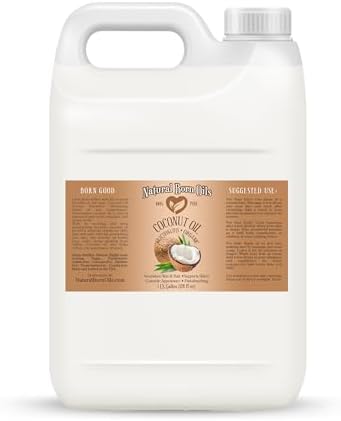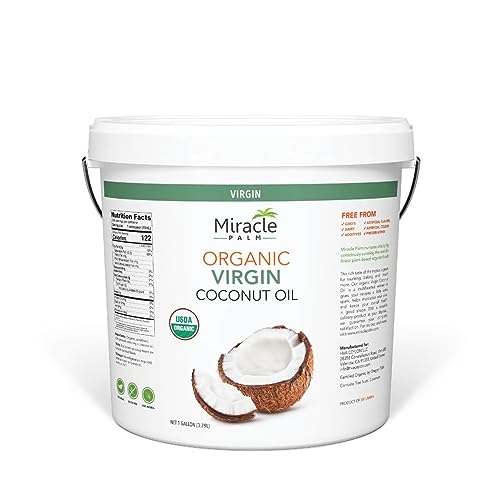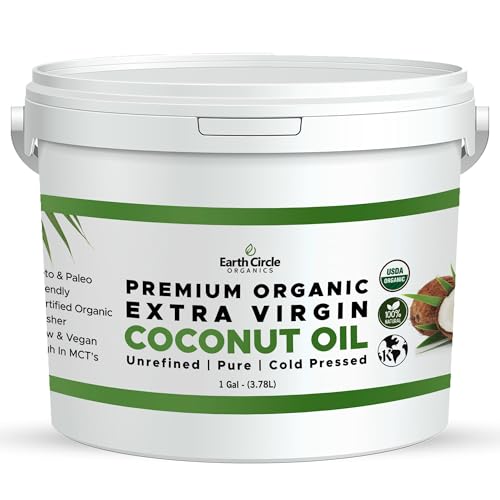Learn why cooking with coconut oil is a healthier choice than sunflower, canola, or soybean oil. Discover its benefits, smoke point, nutrients, and easy cooking tips
100% Cold-Pressed Coconut Oil: Beauty & Health Uses
Coconut oil isn’t just great for your skin and hair—it’s also an excellent cooking oil. In fact, more and more people are switching to cold-pressed coconut oil in the kitchen for good reason.
Compared to traditional vegetable oils like sunflower, canola, or soybean oil, coconut oil stands out as a healthier, more stable, and more flavorful choice. If you’re trying to eat better, support your heart, and avoid processed oils, this post is for you.
Let’s explore why coconut oil belongs in your pantry and why it’s time to ditch the processed stuff.
What Makes Coconut Oil Special?
Coconut oil is made from the meat of mature coconuts. When it’s cold-pressed and unrefined, it retains its natural nutrients and aroma. It contains mostly saturated fats, but don’t be alarmed—these are medium-chain triglycerides (MCTs), which your body burns quickly for energy instead of storing as fat.
Unlike many vegetable oils, coconut oil is chemically stable at high heat. That means it doesn’t break down into harmful compounds when used for frying or baking.
🛒 Shop 100% cold-pressed organic coconut oil for cooking

Coconut Oil vs. Common Vegetable Oils
Let’s break down the key differences between coconut oil and other oils often found in kitchens.
1. Sunflower Oil
- Type of Fat: Mostly polyunsaturated fats (PUFAs)
- Problem: PUFAs are unstable at high heat and can oxidize, forming harmful compounds.
- Nutrient Content: Refined sunflower oil loses most vitamins during processing.
Coconut Oil Wins: It remains stable when heated and doesn’t create toxic byproducts.
2. Canola Oil (Rapeseed Oil)
- Marketing Claim: “Heart-healthy” due to omega-3s.
- Reality: It’s usually highly refined and often comes from genetically modified crops.
- Chemical Processing: Includes bleaching, deodorizing, and high-heat extraction.
Coconut Oil Wins: Cold-pressed coconut oil is natural, unprocessed, and doesn’t need chemical treatments.
3. Soybean Oil
- Common Use: Found in many fast foods and processed snacks.
- Problem: High in omega-6 fatty acids, which in excess can lead to inflammation.
- Health Risks: Linked to imbalances in hormones and gut issues.
Coconut Oil Wins: It has anti-inflammatory properties and supports digestion.
🛒 Try this top-rated coconut cooking oil on Amazon
Health Benefits of Cooking with Coconut Oil
Now that we’ve compared the competition, let’s look at how coconut oil benefits your health when used in daily cooking.
1. Improves Digestion
MCTs in coconut oil help break down food and support nutrient absorption. They also fight harmful bacteria in your gut.
2. Boosts Metabolism
Unlike long-chain fats, MCTs are converted quickly into energy. This helps burn fat and supports weight loss.
3. Supports Brain Function
Coconut oil may offer quick brain fuel, especially helpful for people on low-carb or ketogenic diets.
4. Protects Heart Health
Despite being high in saturated fats, studies show coconut oil may help raise HDL (good cholesterol) and balance cholesterol levels.
How to Cook with Coconut Oil
Coconut oil is extremely versatile. You can use it in nearly every dish, from sweet to savory.
✅ Use It For:
- Sautéing vegetables
- Frying eggs or meats
- Roasting potatoes
- Baking cookies or muffins
- Making smoothies or bulletproof coffee
✅ Quick Tips:
- Use refined coconut oil if you don’t like the coconut flavor (good for neutral dishes).
- Use unrefined coconut oil if you enjoy a light coconut taste (great for curries or stir-fry).
- Store in a cool, dry place. It may solidify in cold climates, but that’s normal. Just warm it up!
🛒 Get refined coconut oil for flavorless cooking
Smoke Point: Is It Safe to Fry?
Absolutely. Coconut oil has a smoke point of about 350°F (177°C) for unrefined and 400°F (204°C) for refined versions.
That means you can safely use it for most frying, baking, or sautéing tasks without worrying about releasing toxins—unlike many seed oils that break down at lower temperatures.
Why You Should Avoid Highly Processed Oils
Vegetable oils go through heavy industrial processes to make them shelf-stable and flavor-neutral. These include:
- High-heat extraction
- Solvent chemicals (like hexane)
- Bleaching and deodorizing
- Hydrogenation (which creates trans fats)
These steps can create oxidized fats and free radicals, which may increase your risk of inflammation, heart disease, and even cancer.
Coconut oil, when cold-pressed and unrefined, skips all of that. It’s simple, clean, and full of real nutrients.
Final Thoughts
If you care about your health, it’s time to rethink your cooking oils. While sunflower, canola, and soybean oil are cheap and widely used, they don’t offer much when it comes to nutrition or safety.
Cold-pressed coconut oil, on the other hand, gives you a powerful combination of flavor, stability, and health benefits. It’s an easy switch that makes a big difference.
So the next time you’re cooking, reach for coconut oil—you’ll taste the difference, and your body will thank you.
🛒 Ready to upgrade your kitchen?





[…] Why Coconut Oil is Better Than Vegetable Oils […]